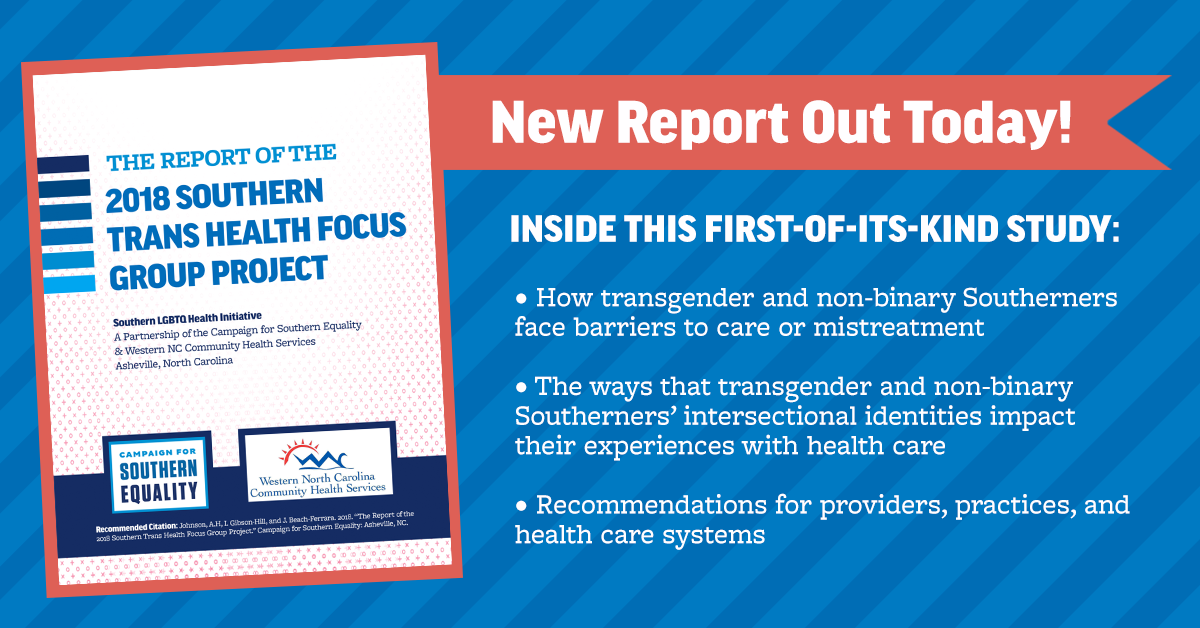Today, the Campaign for Southern Equality and Western NC Community Health Services published a groundbreaking new executive report on transgender health in the South. “The Report of the 2018 Southern Trans Health Focus Group Project” documents the findings of a community-based research project through which diverse transgender Southerners across six states shared in-depth accounts of their experiences related to health issues and accessing health care.

According to 2016 data published by the Williams Institute at the U.C.L.A. School of Law, approximately 500,000 transgender people live in the South. Nationally, data shows that approximately 25 percent of transgender people do not seek health care at all because of a fear of discrimination – but to date there has been remarkably limited research about the health experiences of transgender people in the South.
Dr. Austin H. Johnson, Principal Investigator for the Southern Trans Health Focus Group Project and Assistant Professor of Sociology at Kenyon College, said:
“This project is the first of its kind to highlight the health care experiences of transgender Southerners, since research about transgender people is largely concentrated in northern and coastal urban centers. From cities to rural towns across the South, our research team spoke with trans and non-binary people who were eager to tell us about their experiences accessing health care and who were fired up about making change in their local communities. The stories we heard suggest that the change they seek is urgent, as many trans and non-binary people across the South find it difficult to access quality and consistent care for even their most basic health care needs. This report is a call to action.”
Key findings of the research include:
- Many transgender Southerners report experiencing barriers in accessing basic services and in being treated with respect and dignity in medical settings.
- Factors including race, age, and living in a rural community increase the likelihood that transgender Southerners will experience hostility or other significant barriers when seeking care.
- Transgender Southerners report that having access to strong networks of peer support contribute to feeling empowered to seek health care and to advocate for their needs and rights in health care settings.
The report also includes recommended practices for Southern health care providers seeking to offer transgender-friendly health care, from the design of intake paperwork to clinical practices during exams.
“This report provides much needed information about the experience of trans and gender diverse people seeking healthcare in the South. We are happy to partner in this important work with the goal of improving access to care and educating health care providers. I especially appreciate the ‘Recommendations for Southern Providers, Practices, and Health Care Systems’ at the end, which provides very clear and concrete steps that clinics and providers can take to make their practices more gender affirming.” Dr. Jennifer Abbott, Family Physician at Western NC Community Health Services (WNCCHS). Based in Asheville, NC, WNCCHS is one of approximately 200 federally-qualified health centers located across the deep South, and has been providing culturally competent, high quality health care for over 20 years to lower income residents of western North Carolina.
This qualitative research project was conducted as part of the Southern LGBTQ Health Initiative, a collaboration of the CSE and WNCCHS to improve access to LGBTQ-friendly primary care, HIV care and support services across the South. Partners in the project included GenderBenders in Upstate, SC; the Knights and Orchids Society in Selma, AL; and OUTMemphis in Memphis, TN.
Ivy Hill, Community Health Program Director at the Campaign for Southern Equality, said today:
“Across the South, grassroots, transgender-led organizations and local leaders are stepping up to fill in the gaps where systems are breaking down. They are the champions, defenders, and advocates who are picking our people up when we are falling through the cracks. We are so grateful for these leaders and everyone who participated in the Trans Health Focus Group Project – your strength and vulnerability in sharing your experiences with us informed every piece of our recommendations for Southern providers and healthcare systems. Thank you for boldly living your truth and trusting us enough to share that truth.”
The Campaign for Southern Equality will host a free webinar to share the findings of the Executive Report with advocates, health care providers, and community members on January 30, 2019 at 6:00pm ET. Registration information is available here.
Rev. Jasmine Beach-Ferrara, Executive Director of the Campaign for Southern Equality, added:
“Health care is a basic human right. We are working toward a South where transgender people can access the highest standard of care in their hometowns, no matter where they live. Until that day comes, we’ll keep pushing and working to create bridges into the care, services, and support people need and deserve.”

